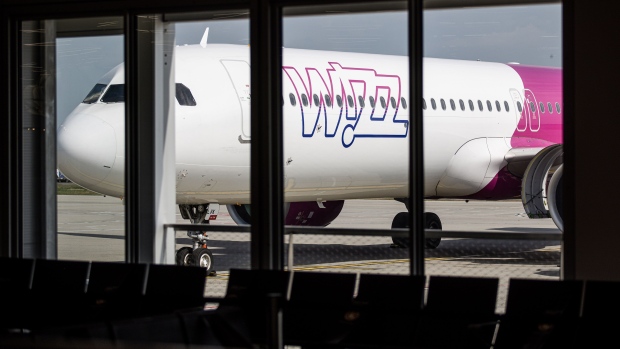Jun 8, 2023
Wizz Air Sees Return to Profit after Post-Pandemic Travel Surge
, Bloomberg News

(Bloomberg) -- Wizz Air Holdings Plc vowed to do a better job handling a surge of customers expected this summer after last year’s mishaps drew the attention of aviation regulators.
The budget airline has added spare aircraft, stocked up on parts and hired more staff to better prepare for peak demand, Chief Executive Officer Jozsef Varadi said in an interview. He said Wizz has more pilots and cabin crew available for contingencies, and has reduced its reliance on outside contractors.
“I don’t think this summer is going to be perfect in terms of the operating environment,” Varadi said. “But we will be a lot more resilient, a lot more robust in processing all those issues affecting us.”
Staffing shortages, last-minute flight cancellations and slow processing of refunds angered travelers last year who overwhelmed Wizz’s operations as they stormed back from a lull in travel after Covid-19. Wizz had by far the highest number of complaints of any airline last summer, according to the UK’s Civil Aviation Authority, which demanded improvement.
Wizz has added four new call centers and a virtual assistant on its website to lessen the demands on staff, Varadi said. Cost levels are coming back down to 2019 and 2020 levels, savings that will be passed on to consumers, he said.
“I’m very confident that people will fly with us,” Varadi said. “People don’t want to be overcharged or ripped off.”
Return to Profit
The CEO spoke Thursday after Wizz forecast a return to profit in the year that started April 1. In a Bloomberg TV interview, Varadi said he was pleased with demand, and the airline operation is stabilized.
Net income will reach €350 million ($375 million) to €450 million in the current fiscal year, the Hungarian carrier said in a statement. That compares with a year-ago net loss of €535.1 million, when Wizz was hit by a surge in fuel prices triggered by Russia’s invasion of Ukraine.
Wizz was more exposed to last year’s oil price jump because it was late to hedge for volatility. Fuel hedges are now in place and those issues are behind it now, Varadi said.
The shares advanced 2.7% at 9:35 a.m. in London. Through Wednesday, Wizz had gained around 46% this year, compared with a 50% advance at EasyJet Plc and a 37% advance at Ryanair Holdings Plc.
Slow Recovery
Wizz profits haven’t rebounded as quickly as competitors such as Ryanair and British Airways owner IAG SA, which earlier raised their full-year earnings outlooks amid pent-up demand. Wizz said its so-called load factor, which indicates cabin occupancy, will be above 90% this year.
Wizz said it will have more than 200 aircraft in its fleet this year, with 63% of them being Airbus A320neo family jets. The airline plans to have 500 planes in operation by 2030, but some analysts say they’re skeptical about whether the airline will be able to fill the new planes when load factor has been below that of competitors.
What Bloomberg Intelligence Says:
The profit forecast “augers well” for Wizz’s operational turnaround. “As with budget-airline peers, we see a strong peak European summer period, though visibility is low for the winter, which may also depend on fuel price evolution and the consumer environment.”
— Conroy Gaynor, BI industry analyst
Demand in central and eastern Europe remains strong, Wizz said. The Budapest-based carrier is growing its network further into eastern Europe, opening up more routes from countries such as Poland, Albania, and North Macedonia.
More than 5 million passengers flew with Wizz in May, a 22.1% jump compared to the same month last year.
“I’m not worried about our ability to fill the planes,” Varadi said. “We’ve got the backbone now for 500 aircraft.”
--With assistance from Siddharth Philip.
(Updates with fresh CEO comment in third paragraph)
©2023 Bloomberg L.P.


